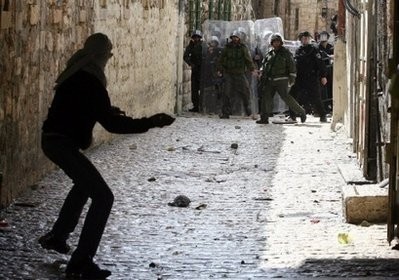Israeli police stepped up security around the Al-Aqsa mosque compound in Jerusalem on Monday after several people were wounded in clashes in and around the fiercely contested holy site.
"We have deployed reinforcements inside the Old City and will continue to limit access to the Temple Mount to Muslim men over the age of 50 as well as women," Jerusalem police spokesman Shmulik Ben Rubi told AFP, referring to the site by its Jewish name.
The compound will also be open to tourists "like any normal day," he added.

On Sunday clashes erupted after Muslim worshippers threw stones at a group of visitors they believed were Jewish extremists threatening the tense status quo of the site, where only Muslims are allowed to pray.
Israeli police entered the compound soon thereafter firing tear gas and rubber bullets that led to clashes near the 400-year-old walls of the Old City in mostly Arab east Jerusalem, occupied by Israel in 1967.
Police spokesman Micky Rosenfeld said that seven people had been arrested, and that two of his men were hurt, while Palestinian sources said at least 15 people were injured in the confrontations.
The Al-Aqsa mosque compound is the holiest site in the world for Jews and the third holiest for Muslims after Mecca and Medina. It has been a tinderbox for Israeli-Palestinian violence for decades.
The Palestinians expressed outrage over the incidents, with chief negotiator Saeb Erakat calling for "urgent intervention" from the United States to get Israel to halt its "attacks" on Al-Aqsa and the two West Bank holy sites.
"These absurd Israeli policies are aimed at destroying international efforts and especially the US administration's efforts to restart a serious and genuine peace process," he said.
King Abdullah II of Jordan, which signed a peace treaty with Israel in 1994, and the head of the Organisation of the Islamic Conference (OIC), likewise warned of dangerous repercussions.
"Israel's provocative aggressions on Al-Aqsa would have dangerous repercussions" and could threaten regional peace efforts, the king said.
On Monday, Shmuel Rabinovitch, the rabbi for the Western Wall, a Jewish pilgrimage site adjacent to the site, sought to defuse tensions by reminding Jews that they are forbidden from entering the site for religious reasons.
"The Halacha (Jewish religious law) forbids Jews from entering the Temple Mount. There is no reason to fear that Jews will enter, not only for political and security reasons, but for religious reasons," he told military radio.
Jews are forbidden from entering for fear they would profane the "Holy of Holies" the inner sanctum of the Second Temple that is believed to have stood on the site before it was destroyed by the Romans in 70 AD.
The latest clashes came after a week of protests in the West Bank town of Hebron over an Israeli plan to include two contested holy sites in the occupied territory in a national heritage renovation plan. Related article: Israeli settlers celebrate amid Hebron tensions
The plan, which also includes Rachel's Tomb in Bethlehem, has infuriated Palestinians and been criticised by the United States as a "provocative" act.
























